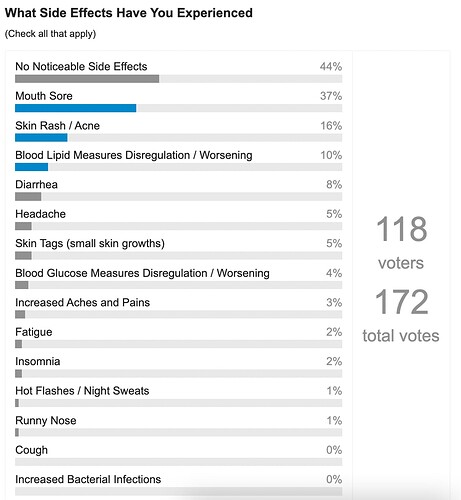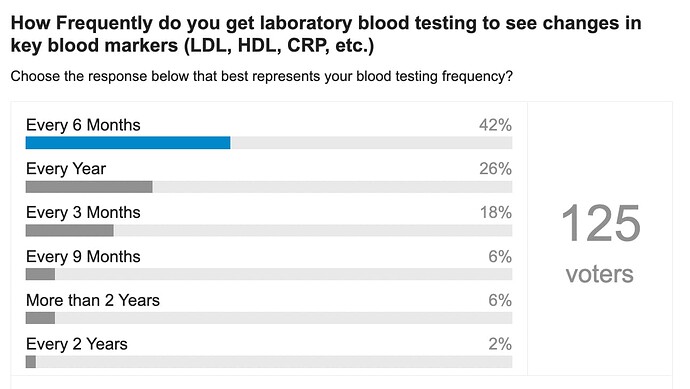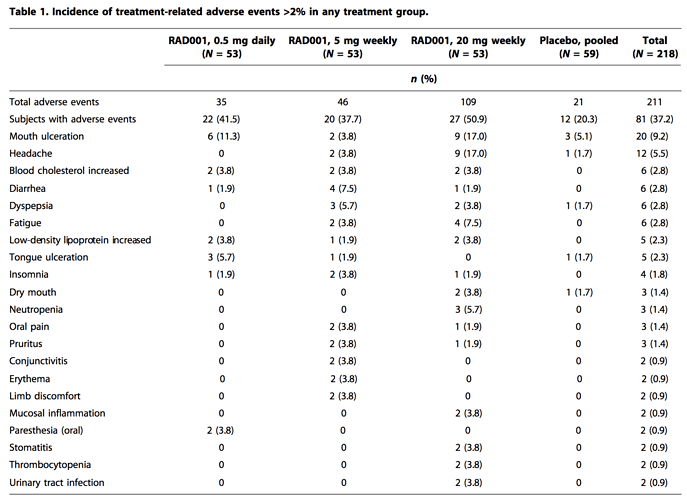Hello! Anybody saw the level of blood glucose increase with rapamycin?
Yes. Most people experience increase.
Lara - I don’t think that is the case. In our poll asking people about side effects only 4% of people identified blood glucose measures worsening… see below:
Source: Rapamycin User Poll / Survey - Please Respond - #4 by RapAdmin
Interesting! Just wondering whether it’s transient. I have a CGM and I went from normal to diabetic range ![]() !
!
Are you talking fasting glucose levels - i.e. measured in the morning?
Also - you have to be careful with CGMs - I use one occasionally and they can easily be off by 10 or 20 points compared to a finger prick test - in either direction. I use the Freestyle libre but was talking to a friend last night and he has the same problem with the Dexcom - its very unreliable for the first 48 hours and the last 48 hours and I think the sensor was only good for 10 days. (and this is even when calibrated).
So - double check with a finger prick tester too. don’t just think the CGM is always right - its not.
Its also interesting to note - I was reading this today in a research paper:
In rodents, the chronic administration of rapamycin as a mono-therapy has often been shown to impair glucose metabolism. For example, both inbred and genetically heterogeneous mouse strains develop glucose intolerance with oral administration of encapsulated rapamycin [11, 37, 38]. In inbred C57BL/6 mice, but not genetically heterogeneous mice, rapamycin is also associated with the development of insulin resistance. Interestingly, these effects of rapamycin on metabolism are dependent on both dose of rapamycin and sex of subjects [38] and do not appear to be permanent alterations as the metabolic defects can be reversed by ending rapamycin treatment [11].
Source: Metabolic consequences of long-term rapamycin exposure on common marmoset monkeys (Callithrix jacchus) - PMC
This issue is covered more by Blagosklonny in this paper:
I thought that it’s an established fact that Rapa elevates glucose if not controlled pharmacologically (Metformin, acarbose, etc). My glucose became borderline (92-99) gradually over 12 years on Rapa (without Metformin or anything else). My strict diet is not enough any longer, so I’m considering Metformin to counter that side effect.
Also want to add that the wording “blood glucose worsening” on the Questionnaire is confusing because answers do not imply that FG readings are within normal range. It could very well be that FG was already elevated (and controlled pharmacologically) and did not become worse (from being already bad). The straightforward questions should be: 1. is your FG within normal range without Metformin, Acarbose, etc. 2. Is your FG within normal range with Metformin, Acarbose, etc. Curious to know how many people would reply “yes” to that direct question.
Dexcom… since I had it (two years) is seldom outside 20% variation. Verified here with pinprick. Not only my baseline is higher (in the diabetic range), but some carbohydrates I tolerated previously, now elevate my glycemia to a high level and for a longer time. Exercise (zone 3 and above) normally drops my glucose level to the point that the dexcom alarms, it now barely dents the trace. Similarly, food that dropped my glucose, no longer do to a noticeable degree …. I will see how it goes in the next few weeks. On the brighter side, I am no longer foggy after taking rapamycin.
Thanks, I’ll read both articles.
Using this poll as evidence to suggest that rapamycin doesn’t negatively affect blood glucose levels is misinformative. We can’t assume every single respondent measured their blood glucose and accurately responded whether their glucose levels worsened on the poll– so the 4% who did mark that down doesn’t really mean anything in the wider picture of the poll if that makes sense
It might be in transplant patients that take rapamycin daily. For pulsed, weekly dosing I think its quite uncommon.
Well, most people do seem to do regular blood work , but I’ll agree that it may not be very precise given some people do blood testing less frequently as shown here:
But in the clinical study done by Jane Mannick / ResTorBio they didn’t report significant issues with blood glucose disregulation in patients (Rad001 is Everolimus, a rapalog, and very equivalent to rapamycin).
Mannick 2014 paper:
https://sci-hub.se/10.1126/scitranslmed.3009892
The whole area of blood glucose disregulation and rapamycin is an interesting and under-researched area. Some points:
- Some people do get blood glucose disregulation with rapamycin use . The more fequently you dose and the higher the dose, it seems the higher the risk of this.
- We do see this in the mice that do high daily dosing
- We see the same thing with mice (and people I think) who do deep caloric restriction
- But, the mice still live much longer than those who are not on rapamycin
- And, when you take away the rapamycin, the blood glucose disregulation goes away
- So then the question becomes, will it impact humans in the same way - where it may increase blood glucose levels, but it doesn’t matter and the net effect is still positive.
- Or, would we see even better results if we counter the raised blood glucose levels via metformin, etc. - and the results are a little mixed there, but at least in female mice that seems to be the case.
N=1
Yes, the higher the dose of rapamycin the higher the risk of fasting blood glucose.
My own experience is that it rises in doses of 15 - 20mg of rapamycin weekly, but it was not a big increase. ~99mg/dL to ~105 mg/dL and that was transient. At lower doses like the 5mg/week, I am now taking there is no discernible increase.
Hope it is transient too.
Hi
I also bought a cgm, my glucose level has always been around 110 but my glucose level jumped up to 240 . After doing some research, I discovered that high volume vitamin C will elevate your blood sugar. I had just had 35 grams via IV the day before , this is worth noting. I am not taking Rapamycin because I’m pre diabetic and my glide level spiked when I tried Rapam .
IMO: Taking high doses of vitamin C is more harmful than taking rapamycin. Who prescribed such a massive vitamin C infusion?
It seems to me that if I had type II diabetes, I would get on rapamycin as soon as possible.
This is just my opinion and not medical advice. I would suggest reading the many articles that favor the the use of rapamycin in the case of type II diabetes. I could not find any articles that suggested that a person with type II diabetes should not take rapamycin.
“Puzzlingly, rapamycin can induce insulin sensitivity, but may also induce insulin resistance or glucose intolerance without insulin resistance. This mirrors the effect of fasting and very low calorie diets, which improve insulin sensitivity and reverse type 2 diabetes, but also can cause a form of glucose intolerance known as benevolent pseudo-diabetes. There is no indication that starvation (benevolent) pseudo-diabetes is detrimental.”
'“Rapamycin prevents insulin resistance caused by nutrient infusion in humans21, diminishes insulin resistance in diabetic and hyperinsulinemic rats26,27, and normalizes glucose metabolism in diabetic mice”
“The harmful effects of diabetes are related mostly to its complications, which include nephropathy. In both rats and mice, rapamycin prevents or ameliorates diabetic nephropathy”
“Recent studies highlight the previously unrecognized link between metabolic disorders, such as diabetes mellitus, and cognitive loss”
“The mechanistic target of rapamycin (mTOR), a principal component for mTOR Complex 1 (mTORC1) and mTOR Complex 2 (mTORC2), and circadian clock genes are exciting novel targets to treat cognitive loss through metabolic pathways”
“In T2D islets, rapamycin improved insulin secretion, reduced beta cell apoptosis and preserved insulin granules, mitochondria and endoplasmic reticulum ultrastructure; this was associated with a significant reduction in PERK, CHOP and BiP gene expression”
Thank you Desertshores , those articles are inspiring, in fact, I am now going back to taking Rapamycin . The high dose Vitamin C was recommended by Dr Kalidas 3 years ago, who is a Alternative medicine specialist, I was very lethargic and unable to cope, I did my research and found him to be a very highly rated doctor. He recommended Ozone blood therapy, Myers cocktail and IV vitamin C ( not taken in the same day of course) blood tests were taken and supplements recommended. After a few months I felt 109% and I was back playing golf 4 times a week. My Husband had the same treatments . This was a 3 times a week protocol for 12 months then once a week and now I have Vitamin C every 6 weeks. We believe that it was this treatment that has kept us free of any seasonal illnesses, and whilst our golfing friend have succumbed to COVD , we have not.
I digress , I have read all of the abstracts on Rapamycin that you kindly sent and I am now convinced that I should restart Rapamycin
Thank you
My insulin went up by one point after 3 months.


